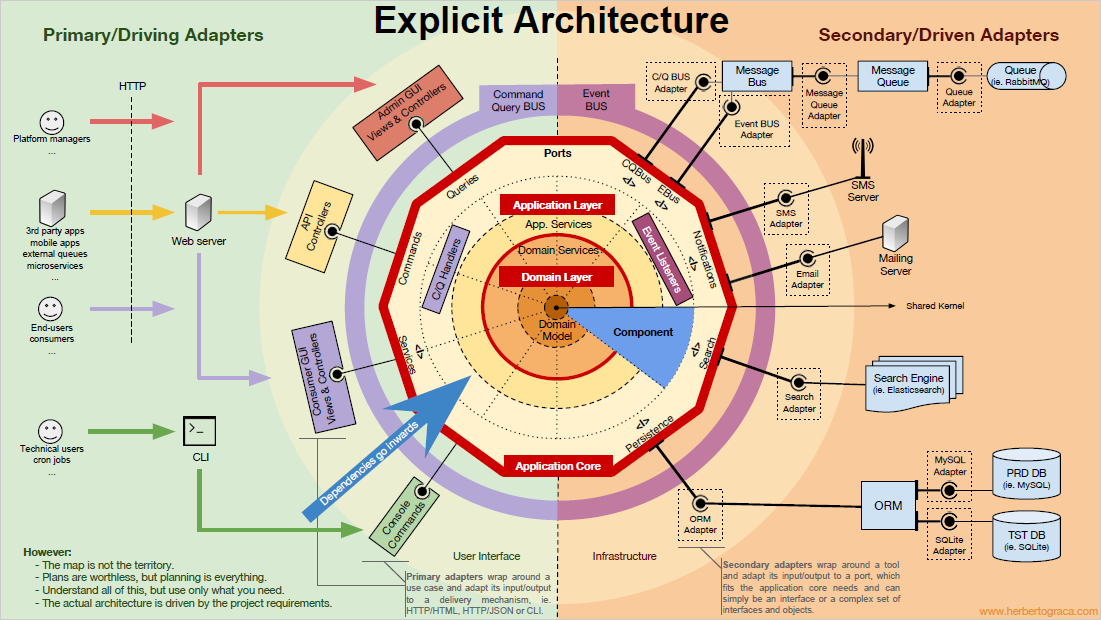Modular-Monolith with DDD - Multiple Clients
An example application and framework built in the modular monolith style with a Domain-Driven Design approach, and Explicit Architecture.
Why?
In theory, theory and practice are the same. In practice, they are not.
I created this project as an exercise for myself to see if the way I imagined a modern architecture actually played out that way when if sit down and code it up. Unsurprisingly I've learned a few things.
Table of Contents
Inspiration
This is not an original idea.
I was most inspired to try something like this after stumbling across Kamil Grzybek's excellent repo Modular Monolith with DDD.
In that repository Kamil does essentially this exercise where he builds an entire application (instead of demo-ware). I will not repeat all that he's done in that repo because (a) it's a lot and (b) you should read it for yourself.
However, I have poured over most of his source code and there are certain things, not represented there, which are of particular interest to me.
Technical Inspiration
There are a handful of sources and examples that I have some familiarity with and appreciation for. All subject to my modification of course...
- Herberto Graca's mental model of explicit architecture
- Jasper's application and messaging model
- abp.io's approach to organizing modules and DDD
- Code Framework's approach to well structured XAML-based front ends
- Zoran Horvat's coding style
- Countless others...
My Goals for this Project
Everybody has their own style of coding, but some are better than others. 😏
- I will be following all of the standard rules including GRASP practices, SOLID principles, and proper Object-Oriented Design.
- Yes I will use patterns as they appear; no I will not force them in.
- I will use nullable reference types everywhere.
- I plan to use ideas from functional languages (like F#) in the project. E.g.
Option<T>
- I plan to use ideas from functional languages (like F#) in the project. E.g.
- Code will be defensive by design.
Larger Goals
-
Build out a hand-rolled application framework
- Message Based
- CQRS
- DDD
- Explicit (see below)
- Best Practices
-
Demonstrate modules which use different front-ends.
- WinUI 3 XAML
- REST API
- Console?
- MVC
- Sub-goal: Learn MVC
- Sub-goal: Learn TypeScript
-
Demonstrate modules which use different back-ends
- To force the issue of abstracting persistence
- Maybe even different styles of back-end?
- Relational (we'll start here, in my comfort zone)
- Event Sourced?
- Graph?
- Document?
- CSV? (hehe...)
-
Integrate a module and/or domain logic written in F#
- Sub-goal: Learn F#
Architecture
The top-level architecture is Herberto Graca's
Explicit Architecture.
I strongly recommend you read this series of articles.

Dig into the architecture.
Code Style
Object-Oriented Programming is the transpose of Functional Programming.
OOP is good when you have lots of types which share behavior, or can be composed together.
- Adding a new type to a hierarchy is easy (one new class)
- Adding a new method to the top of a hierarchy is hard (every class which inherits this needs to be updated)
Functional Programming is good when you a lot of workflows on potentially disparate types
- Adding a new function is easy (one new function)
- Adding a new type is hard (every function that uses it needs to be updated)
So, there's a trade-off between the two which hinges around the likelihood of having to add new behaviors to existing types in the system, or to add new types with similar behaviors to the system.
That said, DDD tells us to use immutable value objects as much as possible. Similarly, functional programming almost always focuses on immutable objects.
Because C# is OO-first, the solution will include plenty of objects, hopefully designed well. But, the lessons learned from the functional-style should be used as much as possible. This includes things like honest method signatures, Railway-Oriented programming, and a functional design.
If you can, I would recommend that you watch everything by Zoran Horvat over on Pluralsight. A lot of similar information is found on his website as well.
Code Quality
Qualities we want in our codebase:
- Maintainable Making a change in one area of the system impacts only that area
- Extensible Adding new behavior to the system involves writing new code, not modifying existing code
- Testable The system is structured in such a way that tests can be easily written to verify behavior
- Modular The system is packaged in such a way that distinct components are logically separate and reusable
- Encapsulated Each module of the system has complete ownership over the data and behaviors it represents
- Discoverable Looking at any module of the system should provide feedback about how it used and what it does
These code qualities apply at all leveles of software. More here.